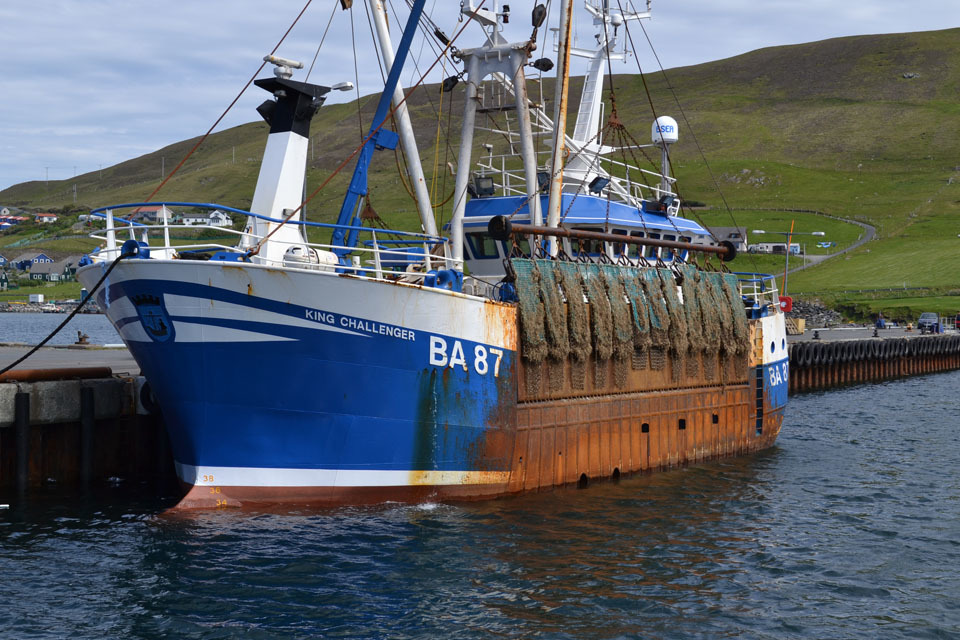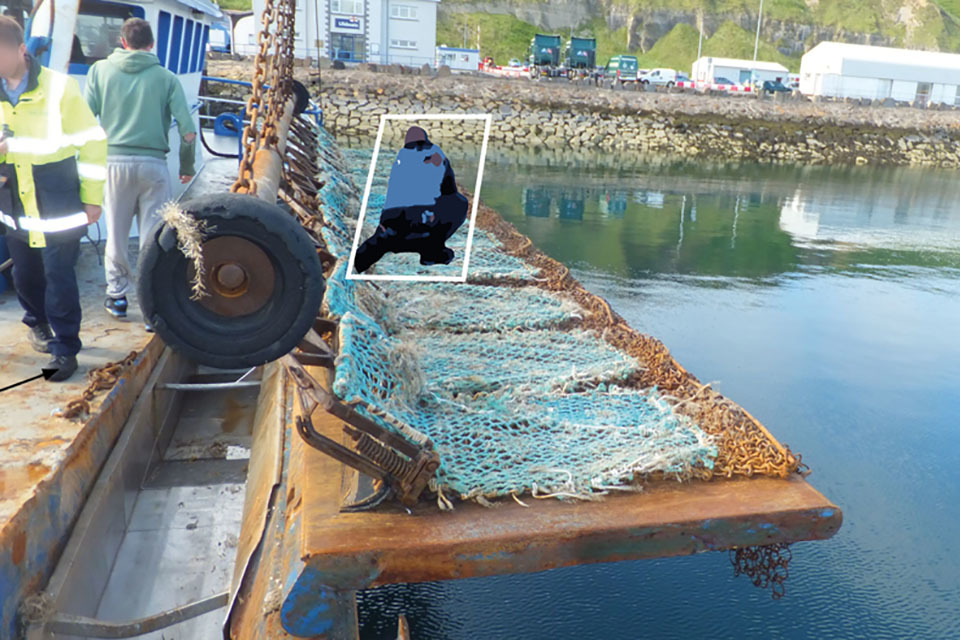Safety flyer to the fishing industry - King Challenger
Published 2 March 2017
1. Summary
Fishing vessel King Challenger (BA 87) fatal man overboard accident on 23 June 2016
2. Narrative

The scallop dredger King Challenger alongside
On 23 June 2016, at about 0940, a crewman from the 21.3m long scallop dredger King Challenger (Figure 1) fell overboard when he was attempting to unhook a damaged dredge bag from the end of the tipping door (Figure 2). He was not attached to a safety line and was not wearing a lifejacket. At the time of the accident, the vessel was 12nm south-west of Scalloway in the Shetland Islands. The sea water temperature was 10.5ºC.

Illustration to show position of crewman on the vessel's tipping door
Within 4 minutes of entering the water, the crewman became unresponsive and unable to hold onto a Moby manoverboard harness that had been thrown to him. A deckhand donned a lifejacket and jumped into the sea to attach him to the Moby harness, and the casualty was hoisted back on board. The deckhand then swam the length of the vessel to the ladder built into King Challenger’s hull and climbed back on board. Although the casualty had been in the water for less than 10 minutes, he showed no signs of life and could not be resuscitated despite the crew’s actions and a very quick evacuation to hospital.
3. Analysis
The MAIB investigation found that:
-
The vessel’s risk assessment should have recognised that the practise of walking on the tipping doors was unsafe, and identified safe alternative working practices.
-
Had the crewman been wearing a lifejacket when he entered the water, it is likely that he would have been recovered alive.
-
Unless appropriate, realistic manoverboard drills are carried out, the crew’s reaction will be unplanned, risking delays in recovering a casualty and potentially resulting in additional casualties.
4. Safety lessons
-
Tipping doors have no protective barriers around them or interlocks to stop them from moving. They should only be accessed under strictly controlled conditions. Safe alternatives, which do not include walking on the tipping door, must be identified for maintenance tasks such as dredge bag repairs.
-
Cold water shock will be the first reaction to falling into water below 15ºC. Death can sometimes occur within the first 30 seconds. Cold incapacitation follows immediately and within the next 3 to 4 minutes progressive loss of movement in the limbs will occur. During this stage, death by drowning can occur unless a lifejacket is worn, and the casualty will not be able to assist in their recovery.
-
Rescuing an incapacitated or unconscious crew member from the sea is extremely difficult. Regular manoverboard drills using a representative dummy will help prepare skippers and crew for dealing with such an emergency. Any rescuer who enters the water must always wear a survival suit and be attached to the vessel at all times with a lifeline.
-
Wearing lifejackets while on the working deck of a vessel can save lives in man overboard situations by:
-
Keeping the casualty’s face clear of the water.
-
Reducing the load on the heart as the casualty won’t have to exert energy to stay afloat.
-
Making the casualty more visible in the water, thus helping rescuers to find them.
-
Providing additional insulation from the cold.
Our accident investigation report is available at: https://www.gov.uk/maib-reports/man-overboard-from-scallop-dredger-king-challenger-with-loss-of-1-life
For all general enquiries:
Marine Accident Investigation Branch
First Floor, Spring Place
105 Commercial Road
Southampton
SO15 1GH
Email iso@maib.gov.uk
Enquiries during office hours +44 (0)23 8039 5500

